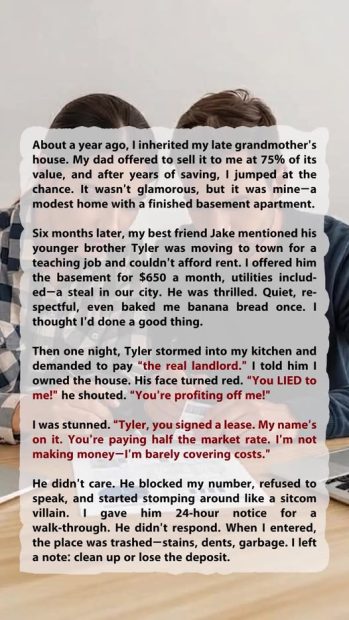
When I inherited my grandparents’ house, I felt lucky—young, debt-free, and finally independent. Wanting to help someone out, I rented the basement to my friend’s brother at a heavily discounted rate. He seemed grateful at first, but things changed when he discovered I owned the house. Suddenly, I was a “scammer,” accused of exploiting him. I was stunned. I’d never hidden the truth—I just didn’t flaunt it. What started as a kind gesture turned into a storm of entitlement and resentment. And I learned the hard way: generosity doesn’t always breed gratitude. Sometimes, it breeds outrage.
He confronted me one evening, furious. “You own this place? And you’re charging me rent?” His tone was venomous, as if I’d tricked him. I reminded him the rent was far below market value, and that I’d never claimed to be just another tenant. But he didn’t care. To him, ownership meant I should’ve let him live there for free. The logic baffled me. I wasn’t a landlord looking to profit—I was a friend trying to help. But suddenly, I was the villain.
Word spread fast. My friend called, asking why I hadn’t disclosed the ownership. I explained it wasn’t a secret—it just never came up. I wasn’t hiding anything. But the damage was done. The brother moved out, leaving behind a mess and a bitter taste. I felt betrayed. Not just by him, but by the assumption that kindness should come with self-erasure. I’d offered a hand, and he bit it.
The experience changed me. I became more cautious, more guarded. I still believe in helping others, but now I set clear boundaries. I learned that transparency isn’t just about facts—it’s about managing expectations. And that some people will twist generosity into manipulation if they feel slighted. I didn’t scam anyone. I gave more than I had to. And I paid the emotional price.
Months later, I ran into him at a coffee shop. He looked sheepish. We exchanged awkward hellos. No apology, no acknowledgment. Just silence. I realized then—I wasn’t angry anymore. I was free. Free from the guilt, the drama, the need to explain myself. I’d done nothing wrong. And I didn’t need his validation to know that.
I share this not to shame him, but to warn others: kindness must be paired with clarity. If you help someone, make sure they understand the terms. Because when people feel misled—even if they weren’t—they’ll rewrite the story. And you’ll be cast as the villain in a tale you never meant to tell.